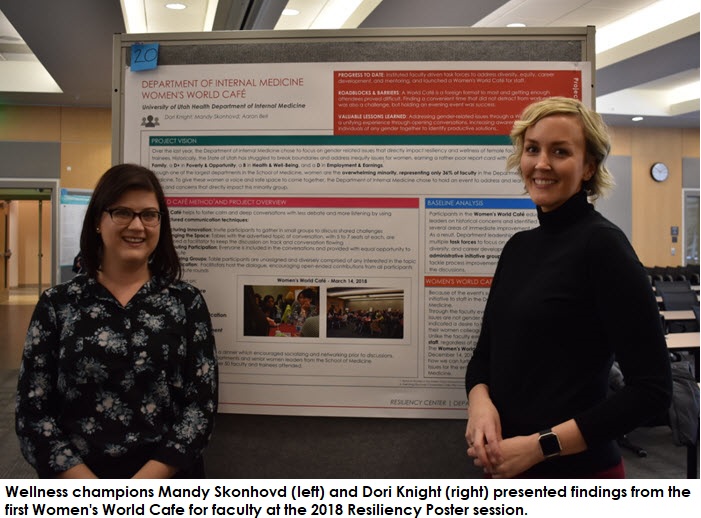Wellness Champion Team Formed to Address Environmental Wellness
The Department of Internal Medicine’s increased focus on wellness for faculty and staff has inspired a project to address workplace incivility and other issues that negatively impact the health and daily well-being of its employees. Though subtle and often swept under the rug, workplace incivility, which ranges from taking credit for or belittling someone else’s work, talking down to others, spreading rumors about colleagues, and even using intimidation to influence decisions, has a negative impact on environmental wellness. This project, accepted by the Resiliency Center as a funded Wellness Champion project, will be a significant area of focus over the next year.
 The project was inspired by the Department’s Waggl survey findings and conversations held at the Women’s World Café event for staff in December 2018. While the Waggl findings showed a desire for better communication, the Women’s World Café event revealed the true need to address workplace incivility and investigate its profound impact on environmental wellness. The Women’s World Cafe provided a safe space and facilitated conversations for staff members to address issues about professional development, HR issues, work-life balance, faculty/staff dynamics, and culture and bias.
The project was inspired by the Department’s Waggl survey findings and conversations held at the Women’s World Café event for staff in December 2018. While the Waggl findings showed a desire for better communication, the Women’s World Café event revealed the true need to address workplace incivility and investigate its profound impact on environmental wellness. The Women’s World Cafe provided a safe space and facilitated conversations for staff members to address issues about professional development, HR issues, work-life balance, faculty/staff dynamics, and culture and bias.
Dori Knight, Faculty Program Manager and a Wellness Champion, facilitated the culture and bias conversation at the Women’s World Café event. It was through the facilitated discussions that the topic of workplace incivility was first addressed. “The modern workplace is constantly evolving and we plan to put meaningful measures in place to encourage our faculty and staff to contribute to a more positive and continually improving professional environment,” she says.
Knight is joined by other staff members from department administration to form the Wellness Champion team: Aaron Bell, Director of Finance and Operations; Mandy Skonhovd, Events and Communications Specialist; and Mencily Lee, Administrative Manager. Though a small team, their overall goal is to establish a larger Professionalism Enrichment Committee with participation from faculty, advanced practice clinicians, and staff that more fully represents all facets of the Department.
“This is our call for volunteers,” says Knight. “This is a chance to continue to have your voice heard and to be an agent of transformation in the Department of Internal Medicine.”
The Professionalism Enrichment Committee will actively raise and maintain awareness of professionalism, and help establish an improved culture through the development of an ‘Aspirational Code of Professionalism.’ This code will emphasize a peer-driven culture and will help support standards of professionalism.
Aaron Bell is hopeful it will lead to other workplace improvements. “With professionalism at the forefront of our workplace culture, we hope to see improved faculty and staff dynamics and less HR issues,” he says. “The Aspirational Code of Professionalism is about respect – respect for your colleagues no matter their job title, and respect for your work and how it fits into the big picture of our department’s mission.”
To become a volunteer for the Professionalism Enrichment Committee, please email Mandy Skonhovd (mandy.skonhovd@hsc.utah.edu) with your name, position and division by Friday, May 17. Volunteers for this committee should expect monthly/quarterly meetings, with the first taking place at the end of May (time to be determined based on volunteer schedules).
If you have any questions about Wellness Champions, the Professionalism Enrichment Committee, or the Code of Aspirational Professionalism, please contact Dori Knight (dori.knight@hsc.utah.edu) or Aaron Bell (aaron.bell@hsc.utah.edu).